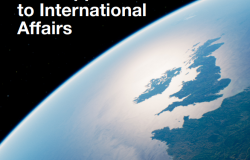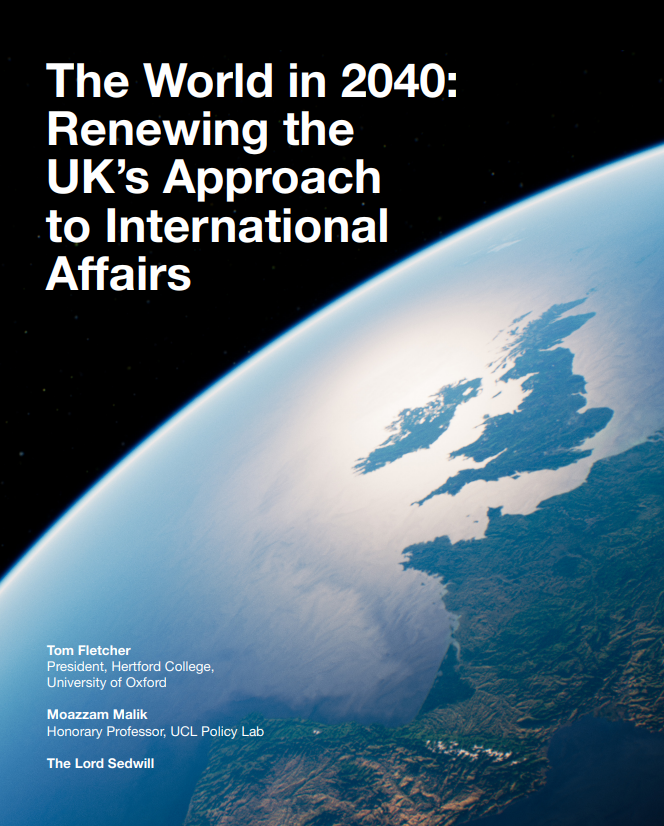A model policy report on the UK’s International Future

Duncan Green overviews a radical proposal for the UK in a changing world.
Just been reading The World in 2040: Renewing the UK’s Approach to International Affairs. In many ways, it’s a model of how to write a good policy report with a chance of impact. Here’s why:
It’s short: 14 pages, with a one page Exec Sum that might actually be read by Execs
Credible and vastly experienced authors: its 3 ‘co-convenors’ are:
- Tom Fletcher, Principal of the Hertford College, Oxford; former No10 Foreign Policy Adviser and HM Ambassador to Lebanon.
- Moazzam Malik, UCL Policy Lab Honorary Professor; former Director General in FCDO and DFID and HM Ambassador to Indonesia and the ASEAN.
- Mark Sedwill, Member of the House of Lords; former Cabinet Secretary, National Security Adviser, HM Ambassador and NATO Representative in Afghanistan.
 Unashamedly insider influencing: Fletcher, Malik and Sedwell ‘convened a group of former Ministers, National Security Advisers, Permanent Secretaries, Ambassadors and senior officials on 18 and 19 October 2023 in Oxford to debate the UK’s approach to international affairs and ideas for reform.’ Lots of concerns on (lack of) inclusion, obviously, but no-one can dismiss this lot as starry-eyed but impractical idealists.
Unashamedly insider influencing: Fletcher, Malik and Sedwell ‘convened a group of former Ministers, National Security Advisers, Permanent Secretaries, Ambassadors and senior officials on 18 and 19 October 2023 in Oxford to debate the UK’s approach to international affairs and ideas for reform.’ Lots of concerns on (lack of) inclusion, obviously, but no-one can dismiss this lot as starry-eyed but impractical idealists.
I presume the main target is an incoming Labour government and I can imagine they will find this kind of weighty review and quite radical proposals very attractive.
So what does it say? A few things that jumped out.
Be More Norway: Time for the UK to get over its colonial past and accept it is now an ‘offshore mid-sized power’. That means working with other middle-sized powers, and earning some leadership points by triggering a bonfire of the colonial vanities, sharing out some of the UK’s inherited rights and power, such as its unwarranted position on the UN Security Council.
Get rid of the colonial trappings of the Foreign Office and create a new Department for International Affairs. That includes abandoning its bonkers building in Whitehall, which is stuffed full of colonial memorabilia. But also more substantive change: ‘The Foreign Office all too often operates like a giant private office for the Foreign Secretary of the day’. To insulate aid from that culture of short termism and political expediency, the report recommends that the new DIA steers long term strategy and policy, but a separate, semi-autonomous agency is in charge of delivery, a bit like Sweden.
Spend more money: The report argues for 1% of GNI for ‘planned international spending’ (i.e. excluding things like Covid) and 2% on defence.
Spend that money in more effective and long-term ways. Beef up the National Security Council, but broaden its mandate to include things like climate change and economic prosperity.
I particularly liked this bit (as I’m sure will Rory Stewart!):
‘Ministers need to be inducted better for their briefs and involved in policy making at the earliest stages. They should be expected to remain in their roles for longer.’
Also:
‘A lot of work that is currently done through consultancies should be brought ‘in house’ to strengthen the government’s expertise and long-term relationships.’
It’s all about the knowledge, not just the cash:
‘We will need to build up deep thematic and regional expertise to help the UK navigate wicked, complex challenges in a shifting geopolitical landscape.
This will need to be complemented by strong formal and informal in-country networks where diplomatic presence can really add value.
Building expertise around stable long-term objectives requires a shift in institutional culture. Career progression in the diplomatic service has disincentivized, even discouraged, specialization leading to a proliferation of generalists and a paucity of deep expertise and networks – both thematic and regional. In contrast, countries like Norway and China keep people in their specialty areas and regions. An outward looking UK will require a more outward facing cadre of civil servants and diplomats: but the FCDO reports 8 that over 70% of ‘UK-based staff’ are working in the UK. More delegated decision-making and authority to people working in embassies would help enable this change.’
I bumped into one of the authors, Moazzam Malik, at the recent Faith and Development conference in London, and he said they had been very pleasantly surprised by the amount of coverage their paper received. I think it’s partly for the reasons I said earlier and partly because of the timing with an impending UK election.
Given the UK’s atrocious fiscal position, any incoming new government will be looking for zero/low cost reforms that send a message without requiring cash. If it takes on board the other suggestions, but does not increase spending, would that be enough for the authors, I wonder?
This post was first published on the LSE’s International Development blog


